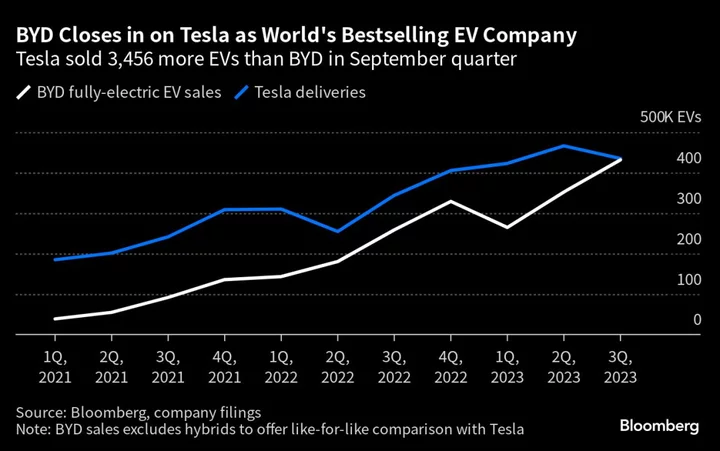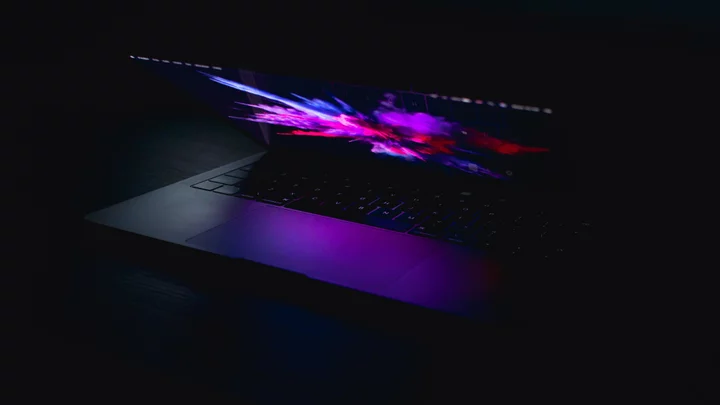Japan’s carmakers are staging their first motor show in four years to make the case they’ll remain major global forces to be reckoned with in the electric-vehicle age.
The rebadged Japan Mobility Show will be counter-programming of sorts to worrisome trends: the host country may well lose its position as the world’s top car exporter to China, and third-largest economy to Germany this year. With their domestic market shrinking and parts of Europe and the US rapidly embracing EVs, Toyota Motor Corp., Honda Motor Co. and their peers are under escalating pressure to transition from internal combustion engines.
Related Stories:
- Japan’s Carmakers Stage Show to Demonstrate Real EV Ambition
- The Top-Selling EV in Japan Isn’t a Tesla, But a $13,000 Kei Car
- World’s Love Affair With Japanese Cars Sours Over EV Blunders
Nissan’s ‘Game-Changing’ Hyper Force Concept (1:15 p.m.)
Nissan unveiled concept models of several electric cars, including the Hyper Force, which includes virtual reality features allowing the driver to indulge in gaming when the vehicle is stopped. They can use a special VR helmet to race against friends or digital manifestations of professionals, according to Nissan. CEO Makoto Uchida described the simulation technology as a game-changer.
Meanwhile, the Hyper Punk can adjust music and lights according to a driver’s mood, and the Hyper Tourer is more of a light, or kei car, with driverless technology. Nissan is marking its 90th anniversary this year.
BYD’s Push Into Japan, World on Display (11:14 a.m.)
BYD, which began selling its all-electric Atto-3 SUV in Japan earlier this year and Dolphin hatchback last month, said its Seal electric sedan will hit the market next spring.
China’s biggest carmaker, which is poised to overtake Tesla as the world’s biggest seller of electric vehicles, has been seeking to expand its global footprint, even in places like Japan, where car buyers prefer domestic brands.
Yamaha Shows Off Electric Three-Wheeler (11:01 a.m.)
The Japanese motorcycle maker displayed the Tricera, an open-topped Batmobile’esque three-wheeler EV under a development concept it calls “Urban Exciting Mobility,” where apparently the “mind, body and machine become one organism.”
The vehicle marks quite a step from the Messerschmitts that emerged from Germany almost 70 years ago.
Lexus Leads Charge Into Toyota’s EV Future (10:41 a.m.)
The Lexus concept LF-ZC will become the centerpiece of Toyota’s campaign to take on Tesla and BYD, with the Japanese carmaker’s premium brand set to go carbon neutral by 2035.
The sleek EV will be sold in 2026, taking advantage of the company’s next-generation battery platform to offer better range and faster charging, Simon Humphries, Toyota’s Chief Branding Officer, said at a presentation.
With Toyota’s forthcoming Arene software, the car will be equipped with intuitive entertainment and monitoring systems, and built using a streamlined production process. The LF-ZC will be powered by a next-generation high-performance lithium-ion battery that will give it 1,000 kilometers (621 miles) of range and charge in 20 minutes, according to the company.
“We believe that BEVs, through their unique attributes, will expand the scope of possibilities,” Humphries said.
Honda Takes on Air, Sea and Space (10:20 a.m.)
Honda is showing an electric-powered vertical takeoff and landing aircraft, an avatar robot as well as its HondaJet business plane at the show.
“My dream is to create a world where people can move freely on the ground, sea and air, as well as outer space, in vehicles bearing the Honda logo, CEO Toshihiro Mibe said during a presentation.
The Prelude appears to be making a comeback. The popular two-door sports car, which was retired in 2001, is now under development as an electric vehicle.
“Honda has been focusing on sports cars in all eras,” Mibe said. “This is something that only Honda can do.”
Subaru Has a Motorsports EV and Flying Car (10:17 a.m.)
Subaru unveiled a motorsports EV concept as well as a flying car it said has already taken to the skies in preliminary tests. The key is figuring out how people will adapt to them.
“We believe air mobility will become a useful means of transportation in the future, but for that we need customers to appreciate how it might fit into their lifestyles,” CEO Atsushi Osaki told reporters. “That will take time.”
Mercedes Aims to Double Japan EV Sales in 2023 (9:55 a.m.)
Mercedes-Benz Japan CEO Kintaro Ueno said he’s hopeful the company will double its EV sales in the country this year, having sold about 1,000 in 2021 and twice as many in 2022.
The German automaker, which launched revamped versions of its GLE SUVs last month, is considering installing fast chargers in Japan in 2024 to help drivers efficiently power their vehicles, Ueno said.
“EVs are still at an early stage,” Ueno said later in an interview with Bloomberg TV. “The entire market is only 2% EVS. Of that, 45% is imported cars, so imported cars are doing very strong — or at least domestic cars aren’t kicking in yet.”
Mazda Puts Iconic Rotary Engine Into Plug-In Hybrid (9:15 a.m.)
Mazda Motor unveiled a concept sports car that uses the carmaker’s rotary engine technology in a hybrid powertrain with a battery that can also be plugged in for charging. The vehicle can be used for everything from commuting, to driving on racetracks or for weekend outings, he said.
“We want to expand the circle of people who feel love for cars,” CEO Masahiro Moro said of the “Mazda Iconic SP” prototype.
Toyota Kicks Off With Focus on Battery-Based Cars (8:50 a.m.)
Toyota CEO Koji Sato kicked off the show at a jam-packed news conference Wednesday with battery-based concept cars that he said would define the carmaker’s future.
Departing from speeches by his predecessor Akio Toyoda, Sato focused exclusively on EVs during his 15 minutes onstage and didn’t get into Toyota’s view that hybrid powertrains and other technologies such as hydrogen will also help it move toward a carbon-neutral future, which has drawn criticism before.
“They aren’t just eco-friendly, they also offer driving pleasure, and they can also offer diverse experiences,” Sato said. Different customers will have different needs, and Toyota will offer something for everyone, he said.
Concept Cars Point Way to Toyota’s EV Future (8:45 a.m.)
Crowds of journalists from around the world packed into Toyota Motor’s booth to watch Sato unveil several EV concepts, including a sports car and an SUV, as well as a modular pickup truck and minivan.
“This is the future that awaits us,” Sato told reporters.
The FT-Se and FT-3e provided a glimpse of the fully electric line-up Toyota will roll out in 2026, while the IMV 0 and Kayoibako offered options that can be personalized based on owners’ needs. These EVs will use Toyota’s forthcoming in-house software, Arene, which Sato said would let drivers order food and access entertainment.
--With assistance from Tsuyoshi Inajima.
Author: Nicholas Takahashi, Masatsugu Horie and Supriya Singh









